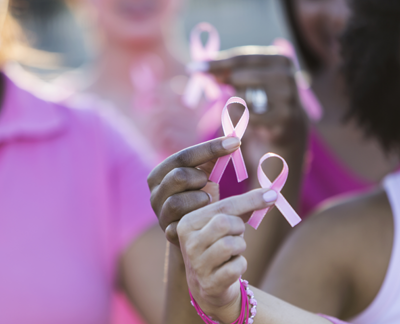Breast Cancer: Early detection and prevention

Understanding breast cancer
Did you know... Breast cancer affects 1 in 8 women during their lives?
Breast cancer is an uncontrolled growth of breast cells. It is true that breast cancer often causes a breast lump to form, which is why we urge all women - including cancer survivors - to encourage one another to adopt a balanced lifestyle and to go for regular screenings.
Many breast cancers are found on screening mammograms which can detect cancers at an earlier stage, often before they can be felt, and before symptoms develop. It is also very important to know your breasts.
The symptoms of breast cancer
There are many other symptoms of breast cancer you should watch for and report to a health care provider for example:
- Pain in the armpits or breast that does not change with the monthly cycle
- Pitting or redness of the skin of the breast, like the skin of an orange
- Rash around or on one of the nipples
- Discharge from a nipple, possibly containing blood
- Sunken or inverted nipple
- Change in the size or shape of the breast
- Peeling, flaking, or scaling of the skin on the breast or nipple
Prevention of breast cancer
There is no sure way to prevent breast cancer, but some lifestyle decisions can significantly reduce the risk of breast and other types of cancer.
Breast cancer prevention starts with healthy habits such as,
limiting alcohol and
staying physically active.
Diet is thought to be at least partly responsible for about 30 to 40 percent of all cancers, giving your body the nutrients it needs is important.When combining exercise and maintaining a healthy weight, eating well is an excellent way to help your body stay strong and healthy.
Smoking and drinking alcoholic beverages can increase a woman's risk of getting breast cancer.
Limiting yourself from smoking and drinking helps lower your chances of developing cancers. Breastfeeding might play a role in breast cancer prevention. The longer you breastfeed, the greater the protective effect. Talk to your doctor or health care professional about how you might lower your risk of cancer.
Breast exams must be done every month! If you are unsure about breast self-examinations, go for regular screenings at CANSA Care Centres, local clinics, community health centres, or a hospital near you. If you are looking for more information about breast cancer, visit the website: http://www.cansa.org.za